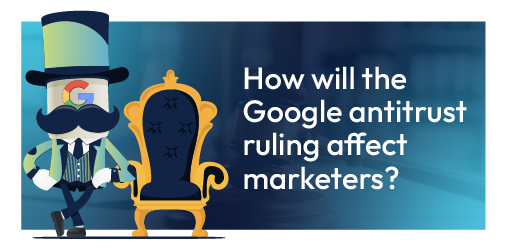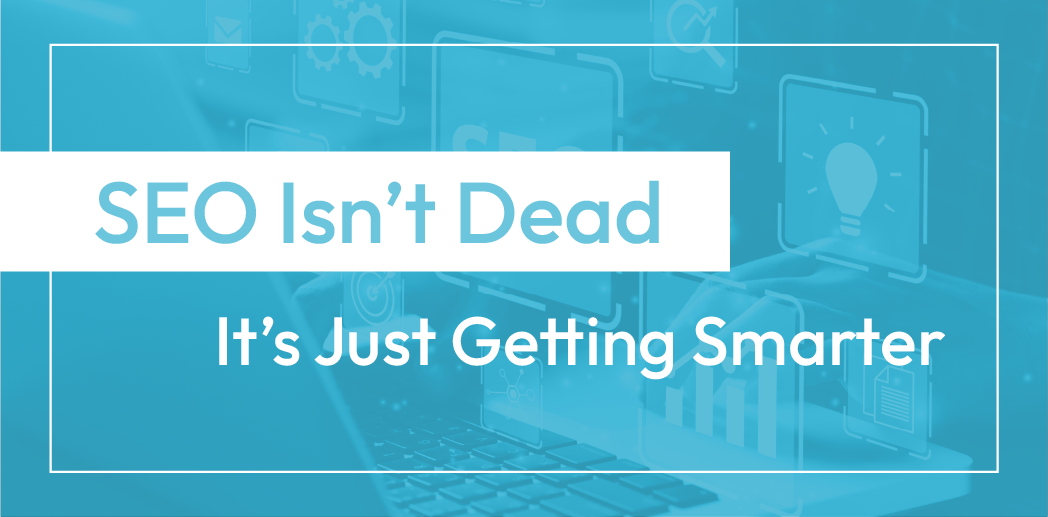Local SEO vs Global SEO
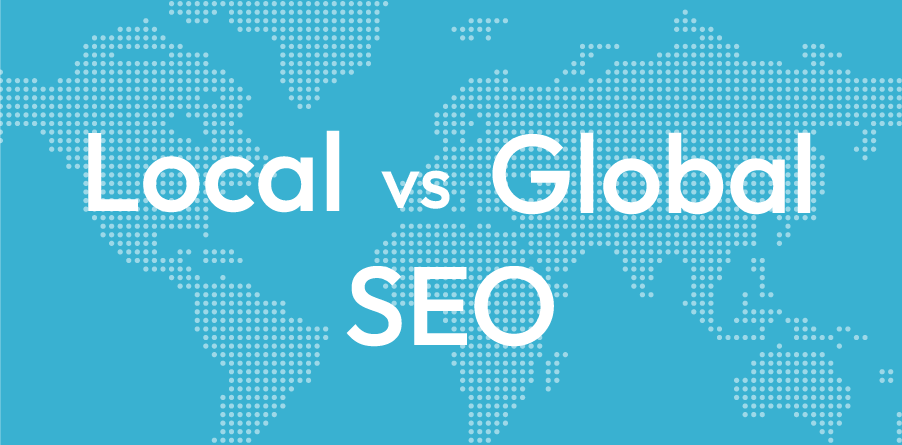
Search engines spark the majority of online experiences. Google is often the go-to starting point for asking questions, finding recipes, shopping, or locating food nearby, and organizations who rank first in the search results for these queries earn the most traffic. SEO is the process of improving an organization’s rankings.
However, SEO is often divided into multiple types, including local and global (or national). Both local SEO and global SEO use different strategies to achieve a similar purpose – prominence on Google.
So, what’s the difference? Which is best for YOUR business?
What is Global SEO?
The phrase "global SEO" is often used interchangeably with "national SEO." However, in the true sense of the word, global SEO requires intensive international optimizations.
In this piece, we will use the term “global SEO” to refer to “national SEO,” SEO that is not limited to a specific location. Truly international strategies – such as copying your website in difference languages – will not be covered in this blog.
Why does global SEO matter?
Global SEO is best for businesses with a national or global target audience. The purpose of global SEO is to improve a business’ online visibility by enhancing website rankings for relevant searches.
Let’s break that down in plain English!
When a Google user enters a query into the search bar, Google returns pages and pages of listings, ranked in order of value to the user. The search engine results page (SERP) contains a variety of features, including paid ads, featured snippets, people also ask boxes, and unpaid organic listings.
When I searched “organic beauty products,” I got some of these features.
First, I saw a few paid ads:
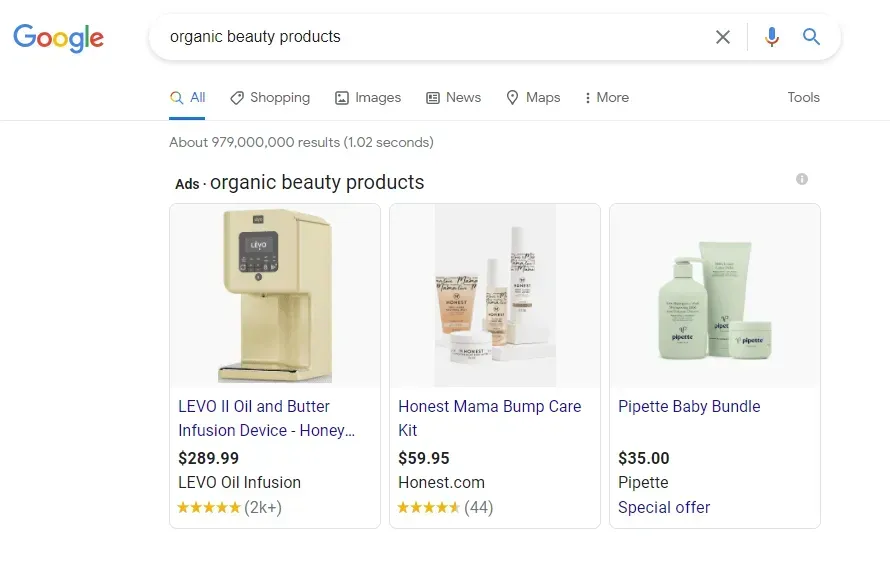
A little further down the page, I found four "people also ask" boxes:
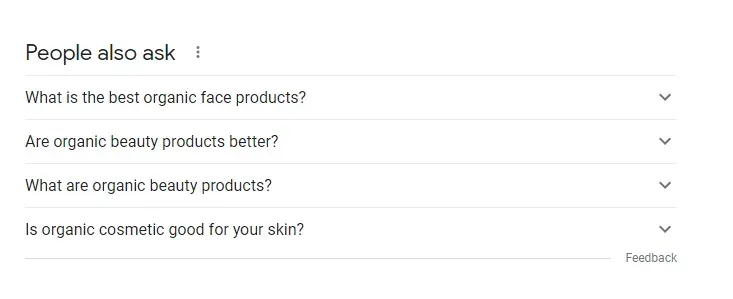
Finally, I came across unpaid organic listings:

Global SEO helps businesses rank towards the top of the SERP in the search features that best serve their goals. Why is this important? Because nearly 70% of all clicks go to the first five search result positions.
Global SEO strategies
How do marketers boost rankings for national or global businesses?
Keyword research and implementation
Keyword research will help define your global SEO strategy, which is why keyword research is often done at the beginning of a campaign. Keyword research identifies the phrases your target audience is really searching for. Once a list of keywords have been identified, these can be used for your on-page optimization and content creation strategies.
Content creation
Global SEO strategies rely heavily on content creation, from blog posts to product, industry, and location pages. One marketer, Heidi Cohen, defines content as:
High-quality, useful information that conveys a story presented in a contextually relevant manner with the goal of soliciting an emotion or engagement. Delivered live or asynchronously, content can be expressed using a variety of formats including text, images, video, audio, and/or presentations.
Every piece of great content provides an opportunity to rank for one or more keywords and “solicit engagement.” Google notices when websites post consistent, high-quality content.
User experience improvements (load time, website organization, and ease of use)
SEO is also about user experience. Attracting high-quality traffic to your site is step one. Step two involves urging those website visitors to convert through strategic, intuitive website design. Minimizing load times, organizing your website in an intuitive fashion, and making conversions straightforward are imperative.
Backlink acquisition
A backlink is a link from one website to another. For example, if my website links to yours, you have received a backlink from me. At RivalMind, we often call backlinks a “vote of confidence” from one site to another.
Backlink acquisition involves actively pursuing these links. We’ve written more about the importance of backlinks for SEO, and I highly recommend reading this piece for more info.
What is Local SEO?
Local SEO is best for businesses with a target audience in a specific locale. For example, brick-and-mortar companies often pursue local SEO, because their target customer is in their area. A local coffee shop, automotive repair garage, chiropractic practice, or pet grooming salon could fall into this category.
Local SEO strategies aim to increase search engine rankings for local searches – queries that are relevant to the searcher based on their location. Great rankings boost website traffic and foot traffic.
Three common SERP features for local searches are the map pack, Google My Business cards, and unpaid search listings.
Let’s talk map pack. For many local searches, such as “near me” queries, the map pack is the first SERP feature listed. The top three results in the map pack are shown directly in the search results page. To see additional locations, one must select “view all.”
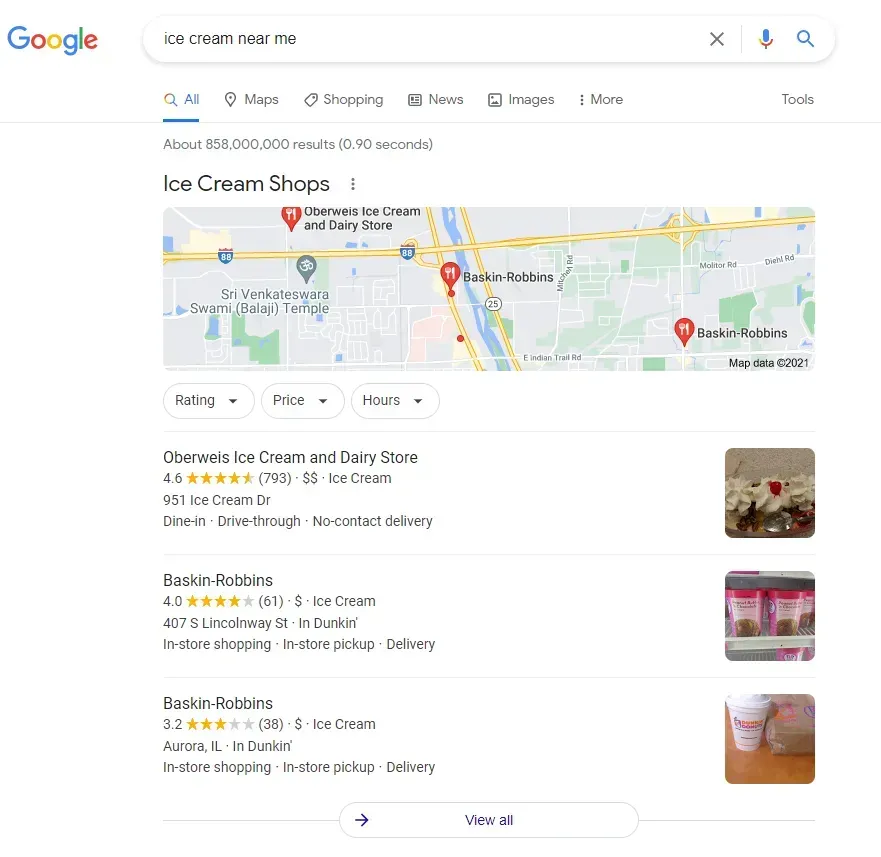
Google My Business (GMB) listings appear to the right of the SERP. In the image below, I’ve outlined Oberweis’ GMB listing in red. GMB listings can appear for branded searches – searches that include the business name, such as in the example below – but they can also return for searches that are relevant to your business.
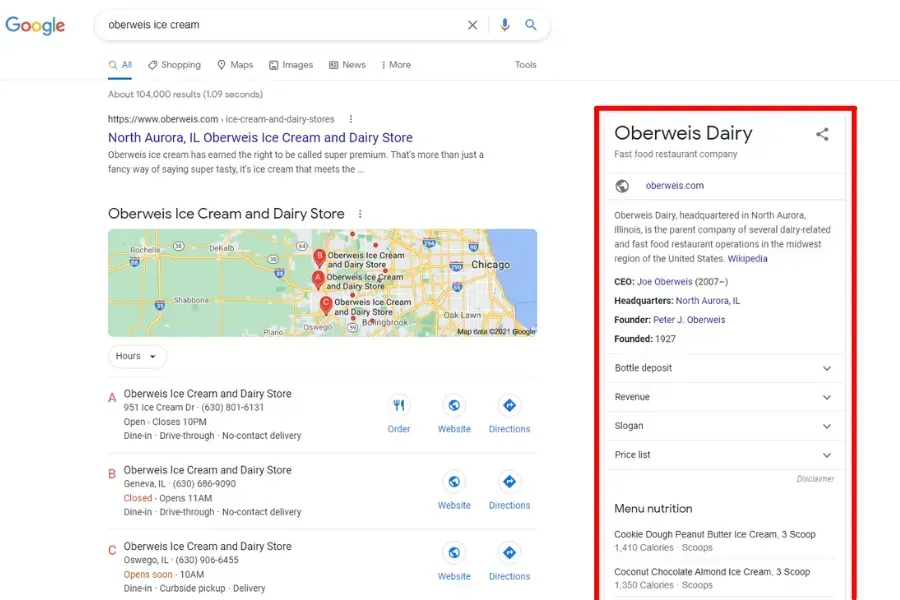
Local SEO strategies
How do marketers boost rankings for local businesses?
Local keyword research and implementation
Local keyword searches often include local qualifiers, such as “near me,” “nearby,” or “in [location].” For example, a pizza restaurant in St. Charles may target “best pizza in St. Charles,” “pizza by the slice in St. Charles,” or “St. Charles pizza” and optimize important website pages for these keywords.
Content creation
While local SEO strategies may include blog writing, content creation will likely focus on other pages, including location or product pages.
Google My Business management
GMB management is a significant component of local SEO. Managing includes making sure all business information is accurate, bolstering the GMB profile with Google posts, and customer review acquisition.
Listings management
Beyond Google My Business, your company’s name, address, and phone number (NAP) are listed in a multitude of places across the web – some you are probably unaware of. In fact, there are 60+ directories. Making sure your NAP is accurate in every listing is crucial. Google values NAP consistency, and prospective customers will be able to accurately contact your business wherever they find your information.
My Business Has a Physical Storefront & Online Store
Some businesses have brick-and-mortar locations and ecommerce platforms. In this case, a customized combination of local and global SEO strategy is best. Most SEO agencies have month-to-month plans, but these are often customizable based on the prospective client’s needs.
This is the beauty of SEO. Though certain strategies provide a framework, every organization is unique, requiring a unique approach to their campaign.
RivalMind: Results-Driven Marketing
At RivalMind, we are genuine in our desire to understand the who, what, and why of every business we serve. This desire informs the questions we ask, the proposals we craft, the questionnaires we send, and the meetings we host.
We are well-equipped to help you choose the best path toward business growth. To get in touch with our team, give us a call at (331) 228-9636, through our online contact form, or via the live chat at the bottom of every website page. We always respond promptly.

Meet the Author
Josiah Flex
Senior Search Manager
Josiah Flex, a digital marketer, is passionate about helping companies see real, lasting growth. With a background in personal training, he enjoys helping people identify and achieve their goals – from online visibility to increased leads. Ultimately, consumers use search engines, like Google, to identify the best answer for their needs, and companies engaged in great SEO have the highest likelihood of winning prospective consumers, one step at a time. This is true success.
Specialties: Building Client Relationships, RivalMind Hype Guy
Looking for more organic website traffic?
Welcome to RivalMind. Our purpose is to help your business thrive. We are a digital marketing agency that offers SEO, PPC, Web Design, Social Media and Video Solutions as tools to our clients for online business development and growth.
Contact us today to get started!
Blog Contact Form
Connect with Us:


